Books by cansu korkmaz
İstanbul'da Büyük Ölçekli Projeler ve Planlama Süreçleri
Papers by cansu korkmaz
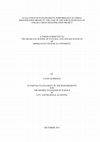
Since the 1980s, many urban regeneration projects have been implemented in different kinds of urb... more Since the 1980s, many urban regeneration projects have been implemented in different kinds of urban areas, such as city centers, housing areas, old-industrial and harbor sites, historical heritage sites. During the last two decades, following the growing attention on urban sustainability, the link between sustainable development and urban regeneration has been strengthened. Urban regeneration projects are attempted to be integrated with social, economic and physical principles of sustainable development. Although, urban regeneration is an important strategy to improve the social, economic and physical conditions in declining cities, the implementation of urban regeneration concept in Turkey has brought about various problems. This thesis aims to evaluate how far urban regeneration projects in Turkey are successful in terms of finding sustainable solutions to the problems in deteriorated urban areas by using sustainability indicators. Ankara has the first examples of urban regenerati...
46. Şehircilik Kolokyumu Bildiri Kitabı, 2023
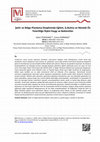
Mimarlık Bilimleri ve Uygulamaları Dergisi (MBUD), Dec 25, 2019
Türkiye'nin savaş sonrası kalkınma hamleleri, yatırımların bölgeler arası farklılaşması, kırdan k... more Türkiye'nin savaş sonrası kalkınma hamleleri, yatırımların bölgeler arası farklılaşması, kırdan kente göç hareketleri, konut taleplerinin hızla artması vb. gelişmeler sonucunda kentlerin kontrolsüz büyümeye başlaması planlı bir kentleşmeyi zorunlu kılmakla birlikte ülkede şehir plancısı ihtiyacını da gündeme taşımıştır. Bu ihtiyacın karşılanabilmesi için dünyada yirminci yüzyılda başlayan planlama eğitimi ülkemizde yarım asrı aşkın bir süre sonra Orta Doğu Teknik Üniversitesi'nde (ODTÜ) Şehir ve Bölge Planlama Bölümü'nün açılmasıyla başlamıştır. Lisans düzeyinde eğitim veren bölümler İzmir ve İstanbul başta olmak üzere diğer kentlerde de yaygınlaşmış, bölüm sayısı özellikle son on yılda ivmelenerek 2018 yılı itibariyle 27'ye ulaşmıştır. Günümüzde kentsel sorunların yaygınlaşması plancıların görev kapsamını genişleterek mesleki açıdan daha donanımlı olmalarını zorunlu kılmıştır. Nitekim şehir plancıları; geleneksel planlama tekniklerinin yanı sıra teknolojik gelişmelere de ayak uydurabilen, parçacıl bakış açısı yerine ilişkisel bütünlüğü sentezleyebilen, sürdürülebilir ve yaşanabilir bir kent için karmaşık kentsel sistemlerin işleyişini yorumlayabilecek teorik, pratik ve teknik bilgi düzeyine sahip olmalıdır. Ancak şehir planlama yaklaşımlarında yaşanan bu devinim, bölüm sayısının hızla artmasıyla birlikte mezunlar arasında daha rekabetçi bir ortamı da beraberinde getirmiştir. Mesleki yeterliliğin ve rekabetin önem kazanması ise hem lisans öğrencileri hem de mezunlarda mesleki bir baskıya, kaygıya sebep olurken planlama eğitiminin çağın koşullarına adaptasyonunu bir kez daha sorgulatmaktadır. Bu bağlamda Türkiye'de Şehir ve Bölge Planlama eğitimi veren bölümlerin öğrenci ve profesyonel plancı (kamu ve özel sektörde çalışan şehir plancıları ile akademisyenler) bakış açısıyla değerlendirilmesi; plancı adaylarını bekleyen iş bulmaya ve mesleki hayata yönelik problemlerin ortaya konulması çalışmanın temel amacını oluşturmaktadır.
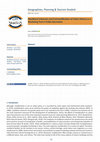
Although neo-liberalism is not an urbanization policy, it has changed urban practices since 1970s... more Although neo-liberalism is not an urbanization policy, it has changed urban practices since 1970s. Neoliberal politics has started to use history, culture, identity, social status, even happiness as a commodity that can be bought and sold to ensure the sustainability of capital. Urban history and cultural heritage have been highlighted in urban spaces, themed projects, shopping malls, residents, and tourism facilities etc. Hereby, cultural heritages and culture have been faced with depreciation and conservation. Cities have transformed into a fragmented structure with replicas and city images are destroyed. In globalization process place that is a significant concept in terms of architecture and urban planning, has started to lose its distinctive character and lost its meaning. Neoliberalism has constituted "non-places" that defines as places which can be seen everywhere without socio-cultural connection. The difference of an area and space is to be identifiable not only spatial but also historical and relational. The case study area, Ecdad Park, is inspired by historical and architectural features of Ottoman and Selçuklu Empire and commodify urban history as a marketing tool. In scope of the research, the effects of commodification of urban history on users' satisfaction is evaluated with "user satisfaction survey". In the light of the results obtained from the survey, density of green areas, cleanness, proximity, security is more effective on user satisfaction rather than historical data and replicas of cultural heritage.
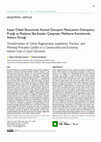
Urban regeneration and urban renewal processes and implementation of the projects are regulated b... more Urban regeneration and urban renewal processes and implementation of the projects are regulated by legislation. Turkey, as an outcome of its fragile and undeveloped political and economic structure, has adopted "a construction-led economic growth and urban regeneration strategy" as a policy to solve economic problems and in 2012 "disaster risky areas" were included within the scope of regeneration with the Law no 6306, which was prepared to transform and accelerate the urban regeneration. Putting forward "struggle with disaster risk" aims to eliminate obstacles leading delays in implementation of regeneration. Disaster-risky urban areas, and unbuilt areas and even the historical and conservation areas have been the subject of regeneration. In this study, "cancellations and court processes which includes determination and boundaries of regeneration areas, announcement and implementation of projects in the period of 2005-2012 in Ankara with high rate of cancellations" is examined. It is aimed to discuss the reasons behind failure to establish the expected relationship between planning principles and so called urban transformation, as well as to debate the conditions and possibilities of the integration of the economic and social components of the city with the planning processes. According to the results of the study, inconsistency of the plan scales in hierarchy; conflict with urban regeneration criteria; the lack of necessary surveys, analyses and assessments to determine urban transformation area boundaries; and the proposed additional building densities that are incompatible with the zoning rights and fair distribution, are the main problems.

Neoliberalism arose as a project to reinforce the power of capitalism against the working class i... more Neoliberalism arose as a project to reinforce the power of capitalism against the working class in the post-1970 period and created unequal geographies as well as unearned incomeoriented urban development practices in which the capital-owning class is operative. As in many other countries, urbanization and the construction sector have been used as important powers in Turkey in absorbing the plus value created by capitalism. After 1980, with the influence of the perspective towards the construction sector and the housing policies of Turkey, luxurious gated communities' production started in metropoles. In an environment of increasing competition, these housing projects started to present nature as a commodity by referring to projects' concepts such as natural life, sustainable environment, ecofriendly, etc. however, in contrast, the living environments they create. This paper aims to evaluate the physical and urban sustainability performances of luxurious gated communities that emphasize natural life and present nature as a commodity by emphasizing natural life and sustainable living environments in Konya by using an indicator-based approach. Even though these new living environments claim to create a sustainable and natural living environment and be eco-friendly projects, it can be seen after the evaluation results that they cannot go further than presenting nature as a commodity. In fact, in this capitalist system, while the construction sector destroys nature, it aims to increase the sales rates of the projects by making use of people's longing for nature.
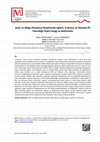
Öz Türkiye'nin savaş sonrası kalkınma hamleleri, yatırımların bölgeler arası farklılaşması, kırda... more Öz Türkiye'nin savaş sonrası kalkınma hamleleri, yatırımların bölgeler arası farklılaşması, kırdan kente göç hareketleri, konut taleplerinin hızla artması vb. gelişmeler sonucunda kentlerin kontrolsüz büyümeye başlaması planlı bir kentleşmeyi zorunlu kılmakla birlikte ülkede şehir plancısı ihtiyacını da gündeme taşımıştır. Bu ihtiyacın karşılanabilmesi için dünyada yirminci yüzyılda başlayan planlama eğitimi ülkemizde yarım asrı aşkın bir süre sonra Orta Doğu Teknik Üniversitesi'nde (ODTÜ) Şehir ve Bölge Planlama Bölümü'nün açılmasıyla başlamıştır. Lisans düzeyinde eğitim veren bölümler İzmir ve İstanbul başta olmak üzere diğer kentlerde de yaygınlaşmış, bölüm sayısı özellikle son on yılda ivmelenerek 2018 yılı itibariyle 27'ye ulaşmıştır. Günümüzde kentsel sorunların yaygınlaşması plancıların görev kapsamını genişleterek mesleki açıdan daha donanımlı olmalarını zorunlu kılmıştır. Nitekim şehir plancıları; geleneksel planlama tekniklerinin yanı sıra teknolojik gelişmelere de ayak uydurabilen, parçacıl bakış açısı yerine ilişkisel bütünlüğü sentezleyebilen, sürdürülebilir ve yaşanabilir bir kent için karmaşık kentsel sistemlerin işleyişini yorumlayabilecek teorik, pratik ve teknik bilgi düzeyine sahip olmalıdır. Ancak şehir planlama yaklaşımlarında yaşanan bu devinim, bölüm sayısının hızla artmasıyla birlikte mezunlar arasında daha rekabetçi bir ortamı da beraberinde getirmiştir. Mesleki yeterliliğin ve rekabetin önem kazanması ise hem lisans öğrencileri hem de mezunlarda mesleki bir baskıya, kaygıya sebep olurken planlama eğitiminin çağın koşullarına adaptasyonunu bir kez daha sorgulatmaktadır. Bu bağlamda Türkiye'de Şehir ve Bölge Planlama eğitimi veren bölümlerin öğrenci ve profesyonel plancı (kamu ve özel sektörde çalışan şehir plancıları ile akademisyenler) bakış açısıyla değerlendirilmesi; plancı adaylarını bekleyen iş bulmaya ve mesleki hayata yönelik problemlerin ortaya konulması çalışmanın temel amacını oluşturmaktadır. Anahtar Kelimeler: Şehir ve bölge planlama eğitimi, şehir plancısı, işsizlik kaygısı, mesleki öz yeterlilik. Mimarlık Bilimleri ve Uygulamaları Dergisi Araştırma makalesi MBUD 2019, 4(2):122-139
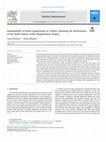
The increasing environmental footprints of cities necessitated the integration sustainability pri... more The increasing environmental footprints of cities necessitated the integration sustainability principles into urban planning and development frameworks. The growing attention on urban sustainability also influenced the policy and the practice of urban regeneration. The quest for new methods for regenerating existing urban quarters in sustainable manners resulted in the concept of sustainable urban regeneration. The concept aims to develop urban regeneration projects in line with the three key pillars of sustainable development. Since the turn of the new millennium, urban regeneration initiatives in Turkish cities have gained a new momentum, mainly due to the increasing interest by public and private sectors. As expected, squatters constituted one of the main focuses of the recent initiatives for urban regeneration. Nevertheless, the Turkish experience of urban regeneration differs from the international experiences in terms of the motivation behind and the scope of the projects. Despite the growing link between sustainability and urban regeneration in international practices, sustainability has not yet been a major motivation for urban regeneration practices in Turkey. This research assesses the sustainability performance of one of the most prominent examples of squatter regeneration in Turkey, namely the North Ankara Urban Regeneration Project (NAURP). The project has been evaluated by means of an indicator-based methodology. The research indicates that the project's contribution to urban sustainability has been minimal and thus, further efforts are required to improve the sustainability performance of urban regeneration projects in Turkey. In the light of this finding, policy implications have been made to push sustainable urban regeneration agenda in Turkey.
Conference Presentations by cansu korkmaz
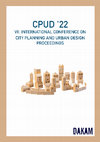
VII. INTERNATIONAL CITY PLANNING AND URBAN DESIGN CONFERENCE CPUD '22 CONFERENCE PROCEEDINGS, 2022
Urbanization is the popular phenomenon in the 1950s that was replaced with counter-urbanization i... more Urbanization is the popular phenomenon in the 1950s that was replaced with counter-urbanization in the 1970s, which defines the population movement from metropolitan areas to rural settlements. The counterurbanization mobility that is directly shaped by economic development, legal regulations, technological developments, causes the socio-economic and spatial transformation of rural settlements. although there are exceptions, the counter-urbanization process is generally associated with economic development. The research aims to reveal the differences of the counter-urbanization movement in developed and developing countries in terms of process, causes, and effects, and how Turkey's counter-urbanization experience differs from the world examples. With this aim, the method of the research is to examine the counter-urbanization literature in-depth, to put forward the counter-urbanization conceptually. While rural development, gentrification, and sustainability are the focus of rural research in Turkey, the counter-urbanization which has a direct impact on rural areas, has not been sufficiently researched yet. In this way, this research contributes to the counterurbanization
literature. However, rural areas are ignored by the legal regulations, rural settlements which are the basis of the country's socio-economic and spatial sustainability are transformed from production centers to consumption centers with the effects of counter-urbanization. The differentiation of the counter-urbanization process according to country, region, and metropolitan scale and blurring of rural-urban borders in metropolitan cities make it difficult to define the counter-urbanization movement. In this context, the definition of the counter-urbanization process within the borders of the metropolitan area, the driving forces causing counterurbanization, and its socio-economic and spatial effects on rural settlements were examined through the example of Istanbul, one of the most important metropolises of Turkey. As seen in the example of Istanbul, the transformation process of the rural life model and the rural economy, the social relations in rural areas, and the counter-urbanized social group differ from the world examples. While the counter-urbanization process emerged with the individual preferences of the households who are ready to adopt the rural life model, in developing countries such as Turkey is managed by mega-scale public and private investments, plan decisions, transformation in legal and administrative structure, and rent. While the rural life form is preserved in developed
countries, the urban and rural population acts with a collective consciousness and social integration is ensured.
For example, while the rural population transfers the place-specific knowledge to the urban population, the urban population supports rural production models with the integration of information technologies and
contributes positively to the socio-economic development of the rural areas. In Turkey, legal regulations, directing public and private investments to rural areas by planning tools resulted in urban sprawl and rural areas
and population urbanized with real-estate and construction-oriented development model. Moreover, counterurbanized groups in Turkey even if the movement reason is natural and rural idly, they prefer to isolate
themselves from the rural population socio-spatially and deepen the social segregation. Although the counterurbanization process in Turkey started at the local level in the 2000s, factors such as the socio-economic
problems experienced in the recent period, the increase in density in the cities and urban problems, the change in the urban demographic structure, and the pandemic trigger the desire for life in the rural areas, and it is
observed that the counter-urbanization trend will continue. In this context, to define the counter-urbanization concept clearly and examine the counter-urbanization process in the world is so important to guide the counterurbanization process in Turkey.
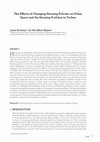
Housing is an important component of the urban economy. Housing has a physical dimension with the... more Housing is an important component of the urban economy. Housing has a physical dimension with the feature of being a residential and sheltered space; it has a social dimension with the feature of being the centre of family and friendship relationship; it has an economic dimension with the feature of being a bought and sold commodity. Economic and politic processes directly affect housing policies in all over the world. After World War II, all countries started to develop housing policies to solve the housing deficiency problem. Housing policies in Turkey also have shown differences in terms of presentation, financial models, legal infrastructure and housing typologies. This research focuses on the effects of the changing housing policies on urban spaces in Turkey from the Republican era up to the present. The housing market has become one of the basic economic sectors with government support, legal regulations and the increasing efficiency of housing investors in the process. The changing in housing policies lead to transform the meaning of housing as an investment tool and luxury consumer goods that create rent, prestige and social status. This paper also aims to argue the social, economic and physical problems caused by the construction-oriented economy in urban space in Turkey. A literature review method is used by gathering data and information from census data, written reports, and formal studies. In the research, it is highlighted that besides social, economic and physical problems on urban space, a construction-oriented economy brought on the agenda of housing problems. The housing problem in Turkey is not related to the housing production level; in contrast, the housing problem is based on the failure to produce habitable and affordable housing stock responding to the needs of different income groups. With the changing policies, housing ceased to be a quantitative problem in Turkey, turned into a qualitative and economic problem.
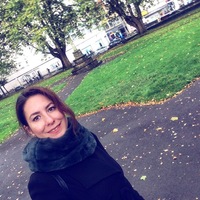
Uploads
Books by cansu korkmaz
Papers by cansu korkmaz
Conference Presentations by cansu korkmaz
literature. However, rural areas are ignored by the legal regulations, rural settlements which are the basis of the country's socio-economic and spatial sustainability are transformed from production centers to consumption centers with the effects of counter-urbanization. The differentiation of the counter-urbanization process according to country, region, and metropolitan scale and blurring of rural-urban borders in metropolitan cities make it difficult to define the counter-urbanization movement. In this context, the definition of the counter-urbanization process within the borders of the metropolitan area, the driving forces causing counterurbanization, and its socio-economic and spatial effects on rural settlements were examined through the example of Istanbul, one of the most important metropolises of Turkey. As seen in the example of Istanbul, the transformation process of the rural life model and the rural economy, the social relations in rural areas, and the counter-urbanized social group differ from the world examples. While the counter-urbanization process emerged with the individual preferences of the households who are ready to adopt the rural life model, in developing countries such as Turkey is managed by mega-scale public and private investments, plan decisions, transformation in legal and administrative structure, and rent. While the rural life form is preserved in developed
countries, the urban and rural population acts with a collective consciousness and social integration is ensured.
For example, while the rural population transfers the place-specific knowledge to the urban population, the urban population supports rural production models with the integration of information technologies and
contributes positively to the socio-economic development of the rural areas. In Turkey, legal regulations, directing public and private investments to rural areas by planning tools resulted in urban sprawl and rural areas
and population urbanized with real-estate and construction-oriented development model. Moreover, counterurbanized groups in Turkey even if the movement reason is natural and rural idly, they prefer to isolate
themselves from the rural population socio-spatially and deepen the social segregation. Although the counterurbanization process in Turkey started at the local level in the 2000s, factors such as the socio-economic
problems experienced in the recent period, the increase in density in the cities and urban problems, the change in the urban demographic structure, and the pandemic trigger the desire for life in the rural areas, and it is
observed that the counter-urbanization trend will continue. In this context, to define the counter-urbanization concept clearly and examine the counter-urbanization process in the world is so important to guide the counterurbanization process in Turkey.
literature. However, rural areas are ignored by the legal regulations, rural settlements which are the basis of the country's socio-economic and spatial sustainability are transformed from production centers to consumption centers with the effects of counter-urbanization. The differentiation of the counter-urbanization process according to country, region, and metropolitan scale and blurring of rural-urban borders in metropolitan cities make it difficult to define the counter-urbanization movement. In this context, the definition of the counter-urbanization process within the borders of the metropolitan area, the driving forces causing counterurbanization, and its socio-economic and spatial effects on rural settlements were examined through the example of Istanbul, one of the most important metropolises of Turkey. As seen in the example of Istanbul, the transformation process of the rural life model and the rural economy, the social relations in rural areas, and the counter-urbanized social group differ from the world examples. While the counter-urbanization process emerged with the individual preferences of the households who are ready to adopt the rural life model, in developing countries such as Turkey is managed by mega-scale public and private investments, plan decisions, transformation in legal and administrative structure, and rent. While the rural life form is preserved in developed
countries, the urban and rural population acts with a collective consciousness and social integration is ensured.
For example, while the rural population transfers the place-specific knowledge to the urban population, the urban population supports rural production models with the integration of information technologies and
contributes positively to the socio-economic development of the rural areas. In Turkey, legal regulations, directing public and private investments to rural areas by planning tools resulted in urban sprawl and rural areas
and population urbanized with real-estate and construction-oriented development model. Moreover, counterurbanized groups in Turkey even if the movement reason is natural and rural idly, they prefer to isolate
themselves from the rural population socio-spatially and deepen the social segregation. Although the counterurbanization process in Turkey started at the local level in the 2000s, factors such as the socio-economic
problems experienced in the recent period, the increase in density in the cities and urban problems, the change in the urban demographic structure, and the pandemic trigger the desire for life in the rural areas, and it is
observed that the counter-urbanization trend will continue. In this context, to define the counter-urbanization concept clearly and examine the counter-urbanization process in the world is so important to guide the counterurbanization process in Turkey.